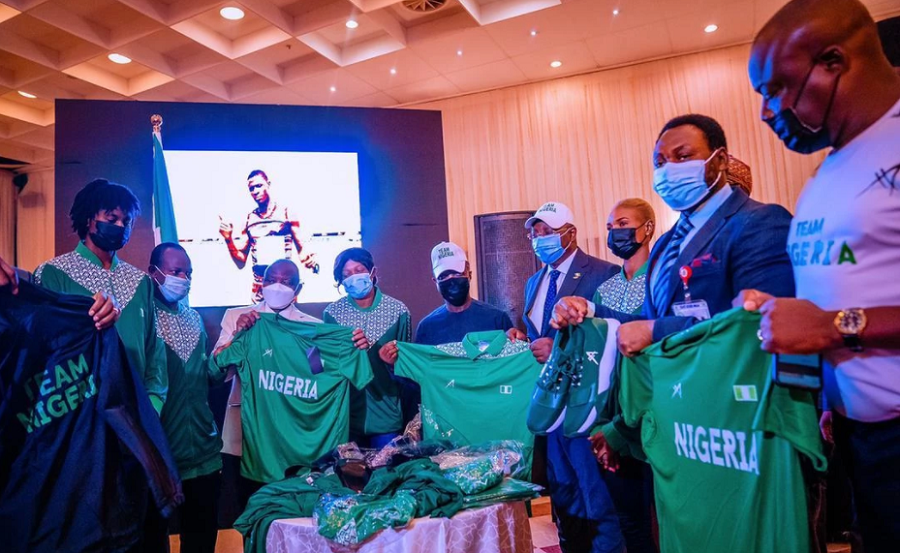The Athletics Federation of Nigeria is working to see if it can salvage the recently terminated PUMA $2.7 million deal which it says was caused by the Sports Minister rejecting athletes’ use of the kits delivered for the Tokyo Olympics.
They added that the leadership crisis, which has rocked the federation, should be resolved soon, giving the rightfully elected Ibrahim Shehu Gusau camp proper autonomous control and preventing another testing blunder at the Olympics.
This was disclosed when Nairametrics interviewed a source in the AFN, who wished to remain anonymous.
READ: Glencore-NNPC scandal: Ex-trader paid $300,000 bribe to government official
Nigeria’s Olympics campaign was hit by a series of scandals, with stakeholders pointing accusing fingers at one another. From news of poor testing, which saw a number of athletes made ineligible to compete, to a subsequent protest by the athletes, which caused a social media ruckus, to the PUMA scandal, which also resulted in the insufficiency of kits available to the athletes.
On the 29th of July, Nairametrics reported that 10 of Nigeria’s athletes who were expected to participate in athletics at the Tokyo Olympics were declared ineligible by the Athletics Integrity Unit (AIU) of World Athletics for failing to meet the minimum testing requirements under Rule 15 of the Anti-Doping Rules.
READ: BUA commences legal action over allegations of involvement in $20 million bribe scandal
The key requirement in Rule 15 is that an athlete from Category A must undergo at least three no-notice-out-of-competition tests (urine and blood) conducted no less than 3 weeks apart in the 10 months leading up to a major event. The news of the ban triggered a series of protests by the athletes in Tokyo, with Nigeria’s Olympic hopeful, Blessing Okagbare calling out sports administrators for ignoring the affairs of the athletes.
A few days later, news emerged that Puma had terminated its $2.7 million contract with Nigeria over kitting conflicts at the Olympics. This came after reports that the German kitting company expressed displeasure with the Federation and Nigeria’s Olympic Committee for using a different kit maker, which contradicted a clause in the contract with AFN.
The Athletics Federation of Nigeria, in a statement, blamed the Sports Minister, Sunday Dare, for the breach of contract, stating that Puma had sent the Olympics gear to the athletes, but that the Minister interfered by writing to the embassy in Japan, stopping the kits from getting to the athletes.
READ: DMO reacts to alleged N1.08 billion corruption scandal rocking the agency
AFN sources who wished to remain anonymous said that the leadership tussle instigated by the Minister affected various operations of the AFN, as testing was not properly complied with, though the autonomous board of the AFN wished to handle it more efficiently.
They also said the deal with PUMA required that Nigerian athletes would wear the kits at major competitions every year and that there was still one competition this year – the World Juniors in Kenya.
The Federation added that based on that, AFN might not want to negotiate a new contract with AFA sports, especially if there might be a chance to still salvage the PUMA deal.
“Maybe if the issues of factions are resolved before the commencement of games, the athletes may wear the puma kit,” they said, adding that the kits were very much in Nigeria, except the ones sent to Tokyo, and they were waiting for the issue to be resolved.
On the issues related to testing
The sources stated that the Ministry was actually in charge of testing, citing that because the Minister had his people who he felt should be there, he had refused to listen to the authentic faction recognised by law. ”He refused to collect the list and go through it because he does not acknowledge them as the AFN leadership,” the source said.
“So all correspondence reaching to the Ministry to get the athletes tested, were not complied with… The issue on ground is, once the issue of factions is resolved, and the rightful officials resume control, they can now put structures in place, that can get athletes tested properly.”
They also added that one of the factors leading to the crisis was that the Gusau faction requested autonomy from the Ministry, such that the federation would be fully in charge of its affairs, from kit supplying to testing, to raising money without waiting for outside help from the Federal Government, but the sole responsibility won’t be on the Ministry.
“The Minister felt wronged, and tried constituting his own AFN, as against the elected members that were there before.
“It’s basically the AFN saying they want to run their affairs as an entity, so that if things like the testing issues come up again, you know who to hold.”
They added that if there had been full control of the rightfully recognized board, there would have been a proper investigation as to who was in charge of testing, and somebody would be held culpable.
Bottomline
Basically, the events in Tokyo would have been prevented if the Federation had full autonomy of its operations. With the leadership distracted by a political tussle with the Minister, the testing compliance was not well done. And then, Nigeria breached its agreement with PUMA, as the Minister reportedly requested the kits not to be transferred to the athletes.
These controversies and many others yet to emerge in public space have turned out be a major part of the roadblock for Nigeria in its bid to boost sports development.









